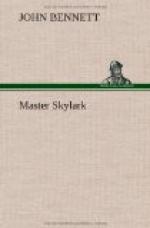“Is it true, sir,” asked Nick, hesitatingly, “that they despitefully handled you?”
“With their tongues, ay,” said Carew, bitterly; “but not otherwise.” He clapped his hand upon his poniard, and threw back his head defiantly. “They dared not come to blows—they knew my kind! Yet John Shakspere is no bad sort—he knoweth what is what. But Master Bailiff Stubbes, I ween, is a long-eared thing that brays for thistles. I’ll thistle him! He called Will Shakspere rogue. Hast ever looked through a red glass?”
“Nay,” said Nick.
“Well, it turns the whole world red. And so it is with Master Stubbes. He looks through a pair of rogue’s eyes and sees the whole world rogue. Why, boy,” cried the master-player, vehemently, “he thought to buy my tongue! Marry, if tongues were troubles he has bought himself a peck! What! Buy my silence? Nay, he’ll see a deadly flash of silence when I come to my Lord the Admiral again!”
CHAPTER VII
“Well sung, master skylark!”
It was past high noon, and they had long since left Warwick castle far behind. “Nicholas,” said the master-player, in the middle of a stream of amazing stories of life in London town, “there is Blacklow knoll.” He pointed to a little hill off to the left.
Nick stared; he knew the tale: how grim old Guy de Beauchamp had Piers Gaveston’s head upon that hill for calling him the Black Hound of Arden.
“Ah!” said Carew, “times have changed since then, boy, when thou couldst have a man’s head off for calling thee a name—or I would have yon Master Bailiff Stubbes’s head off short behind the ears—and Sir Thomas Lucy’s too!” he added, with a sudden flash of anger, gritting his teeth and clenching his hand upon his poniard. “But, Nicholas, hast anything to eat?”
“Nothing at all, sir.”
Master Carew pulled from his pouch some barley-cakes and half a small Banbury cheese, yellow as gold and with a keen, sharp savour. “’Tis enough for both of us,” said he, as they came to a shady little wood with a clear, mossy-bottomed spring running down into a green meadow with a mild noise, murmuring among the stones. “Come along, Nicholas; we’ll eat it under the trees.”




